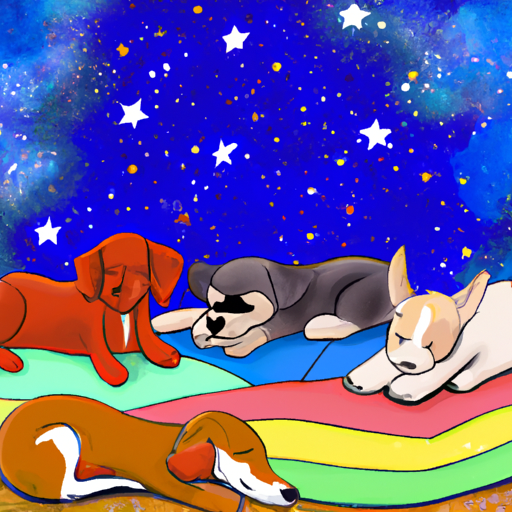As a caregiver for a furry friend, you might wonder about their sleep patterns. Do dogs sleep at night like humans? Are they nocturnal? Understanding your dog’s sleep schedule can help you take better care of them. Let’s dive into it.
Understanding Canine Sleep Patterns
Unlike human beings who have a monophasic sleep pattern (one period of wakefulness and one period of sleep), dogs have a polyphasic sleep pattern. This means they spread their sleep throughout a 24-hour day. However, dogs tend to align their sleep patterns with their human companions. Consequently, most dogs sleep at night and are awake during the day.
Factors Influencing Dog Sleep Patterns
- Age: Puppies and older dogs need more sleep.
- Breed: Larger breeds tend to sleep more than smaller ones.
- Health: Dogs with health issues may require more rest.
- Activity Level: Active dogs might need more sleep to recover.
Dog’s Sleep Cycle
Dogs have a similar sleep cycle to humans, but it’s quicker. They go through two stages: REM (rapid eye movement) and non-REM. The table below gives an overview of these stages.
| Sleep Stage | Description |
|---|---|
| REM | The stage where dogs dream. It makes up about 10% of their sleep. |
| Non-REM | It includes light sleep and deep sleep stages. It makes up the rest of their sleep. |
Nighttime Sleep Vs. Daytime Naps
Dogs can sleep both at night and during the day. However, their nighttime sleep tends to be more restful and uninterrupted, while their daytime naps are lighter.
Changes in Sleep Patterns
If you notice changes in your dog’s sleep pattern, it might be a sign of health problems. For instance, excessive sleep or difficulty sleeping might indicate issues such as depression, diabetes, or hypothyroidism. If you observe any such changes, it’s essential to consult with a vet.
Tips for a Good Dog Sleep
Here are some tips to help your dog get the best sleep possible:
- Create a Comfortable Sleep Environment: Ensure your dog has a clean, comfortable, and quiet place to sleep.
- Keep a Consistent Schedule: Maintain regular feeding, exercise, and sleep schedules.
- Provide Enough Exercise: Regular exercise can help your dog sleep better.
- Limit Nighttime Activity: Try to keep your home quiet during the night to avoid disturbing your dog’s sleep.
Dealing with Sleep Disorders
Just like humans, dogs can also suffer from sleep disorders like insomnia, narcolepsy, and sleep apnea. These disorders can affect your dog’s quality of life. If you suspect your dog has a sleep disorder, it’s crucial to seek professional help.
FAQ
Do dogs dream?
Yes, dogs do dream. They often move their legs, twitch, or make noises during their REM sleep stage.
Is it normal for my dog to sleep all day?
While dogs sleep more than humans, excessive sleep could be a sign of health problems. If you notice a sudden change in your dog’s sleep habits, consult a vet.
Should I allow my dog to sleep in my bed?
This is a personal choice. However, be aware that sharing a bed with your dog can disrupt your sleep and might lead to behavioral issues in the dog.
What can I do if my dog has trouble sleeping?
Try to identify any changes in your dog’s environment or routine that might be causing the problem. If the issue persists, seek professional help.
Remember, understanding your dog’s sleep patterns is a crucial part of taking care of their health and well-being. So, ensure you pay attention to their sleep habits and make any necessary adjustments to their routine or environment.



